Dmytro Mozolevskyi
Towards Outcome-Oriented, Task-Agnostic Evaluation of AI Agents
Nov 11, 2025Abstract:As AI agents proliferate across industries and applications, evaluating their performance based solely on infrastructural metrics such as latency, time-to-first-token, or token throughput is proving insufficient. These metrics fail to capture the quality of an agent's decisions, its operational autonomy, or its ultimate business value. This white paper proposes a novel, comprehensive framework of eleven outcome-based, task-agnostic performance metrics for AI agents that transcend domain boundaries. These metrics are designed to enable organizations to evaluate agents based on the quality of their decisions, their degree of autonomy, their adaptability to new challenges, and the tangible business value they deliver, regardless of the underlying model architecture or specific use case. We introduce metrics such as Goal Completion Rate (GCR), Autonomy Index (AIx), Multi-Step Task Resilience (MTR), and Business Impact Efficiency (BIE). Through a large-scale simulated experiment involving four distinct agent architectures (ReAct, Chain-of-Thought, Tool-Augmented, Hybrid) across five diverse domains (Healthcare, Finance, Marketing, Legal, and Customer Service), we demonstrate the framework's efficacy. Our results reveal significant performance trade-offs between different agent designs, highlighting the Hybrid Agent as the most consistently high-performing model across the majority of our proposed metrics, achieving an average Goal Completion Rate of 88.8\% and the highest Return on Investment (ROI). This work provides a robust, standardized methodology for the holistic evaluation of AI agents, paving the way for more effective development, deployment, and governance.
Reflect, Retry, Reward: Self-Improving LLMs via Reinforcement Learning
May 30, 2025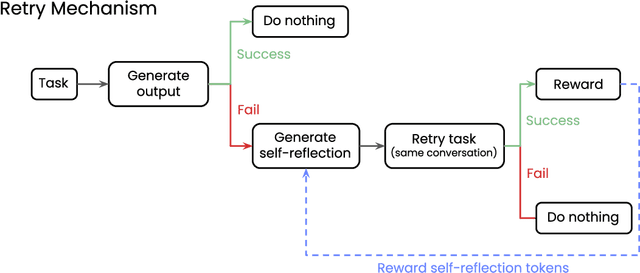
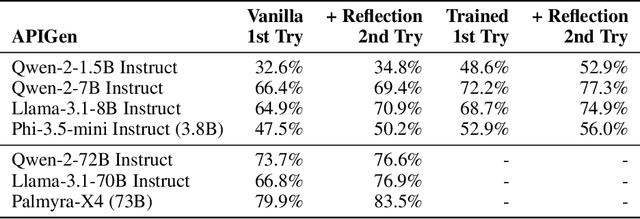
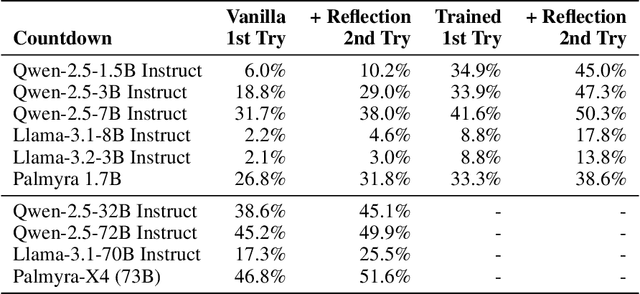
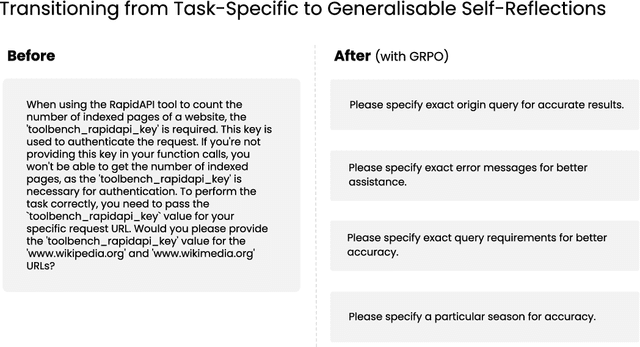
Abstract:We explore a method for improving the performance of large language models through self-reflection and reinforcement learning. By incentivizing the model to generate better self-reflections when it answers incorrectly, we demonstrate that a model's ability to solve complex, verifiable tasks can be enhanced even when generating synthetic data is infeasible and only binary feedback is available. Our framework operates in two stages: first, upon failing a given task, the model generates a self-reflective commentary analyzing its previous attempt; second, the model is given another attempt at the task with the self-reflection in context. If the subsequent attempt succeeds, the tokens generated during the self-reflection phase are rewarded. Our experimental results show substantial performance gains across a variety of model architectures, as high as 34.7% improvement at math equation writing and 18.1% improvement at function calling. Notably, smaller fine-tuned models (1.5 billion to 7 billion parameters) outperform models in the same family that are 10 times larger. Our novel paradigm is thus an exciting pathway to more useful and reliable language models that can self-improve on challenging tasks with limited external feedback.
Expect the Unexpected: FailSafe Long Context QA for Finance
Feb 10, 2025



Abstract:We propose a new long-context financial benchmark, FailSafeQA, designed to test the robustness and context-awareness of LLMs against six variations in human-interface interactions in LLM-based query-answer systems within finance. We concentrate on two case studies: Query Failure and Context Failure. In the Query Failure scenario, we perturb the original query to vary in domain expertise, completeness, and linguistic accuracy. In the Context Failure case, we simulate the uploads of degraded, irrelevant, and empty documents. We employ the LLM-as-a-Judge methodology with Qwen2.5-72B-Instruct and use fine-grained rating criteria to define and calculate Robustness, Context Grounding, and Compliance scores for 24 off-the-shelf models. The results suggest that although some models excel at mitigating input perturbations, they must balance robust answering with the ability to refrain from hallucinating. Notably, Palmyra-Fin-128k-Instruct, recognized as the most compliant model, maintained strong baseline performance but encountered challenges in sustaining robust predictions in 17% of test cases. On the other hand, the most robust model, OpenAI o3-mini, fabricated information in 41% of tested cases. The results demonstrate that even high-performing models have significant room for improvement and highlight the role of FailSafeQA as a tool for developing LLMs optimized for dependability in financial applications. The dataset is available at: https://huggingface.co/datasets/Writer/FailSafeQA
Comparative Analysis of Retrieval Systems in the Real World
May 03, 2024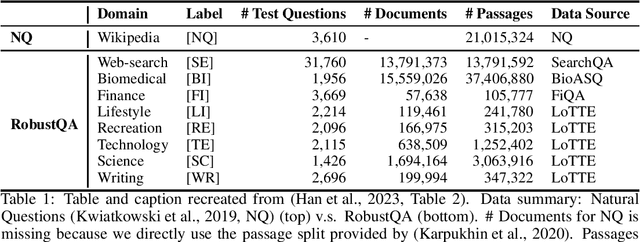
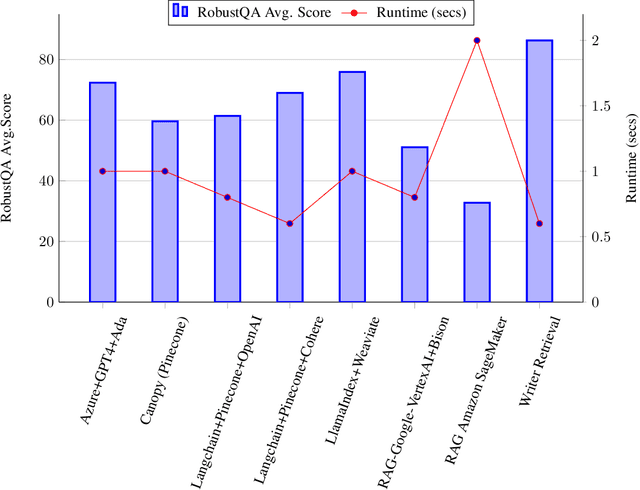
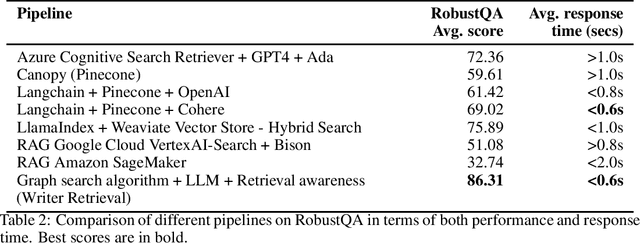
Abstract:This research paper presents a comprehensive analysis of integrating advanced language models with search and retrieval systems in the fields of information retrieval and natural language processing. The objective is to evaluate and compare various state-of-the-art methods based on their performance in terms of accuracy and efficiency. The analysis explores different combinations of technologies, including Azure Cognitive Search Retriever with GPT-4, Pinecone's Canopy framework, Langchain with Pinecone and different language models (OpenAI, Cohere), LlamaIndex with Weaviate Vector Store's hybrid search, Google's RAG implementation on Cloud VertexAI-Search, Amazon SageMaker's RAG, and a novel approach called KG-FID Retrieval. The motivation for this analysis arises from the increasing demand for robust and responsive question-answering systems in various domains. The RobustQA metric is used to evaluate the performance of these systems under diverse paraphrasing of questions. The report aims to provide insights into the strengths and weaknesses of each method, facilitating informed decisions in the deployment and development of AI-driven search and retrieval systems.
 Add to Chrome
Add to Chrome Add to Firefox
Add to Firefox Add to Edge
Add to Edge